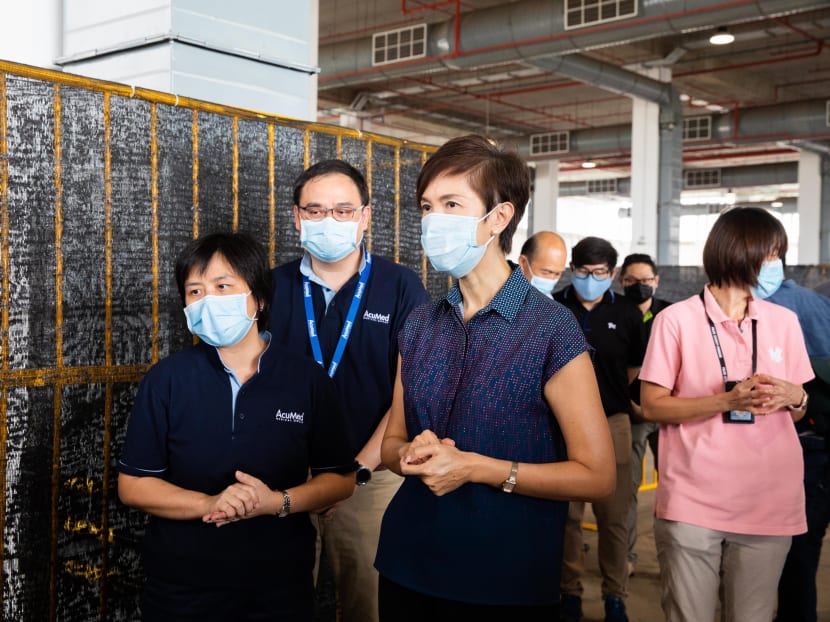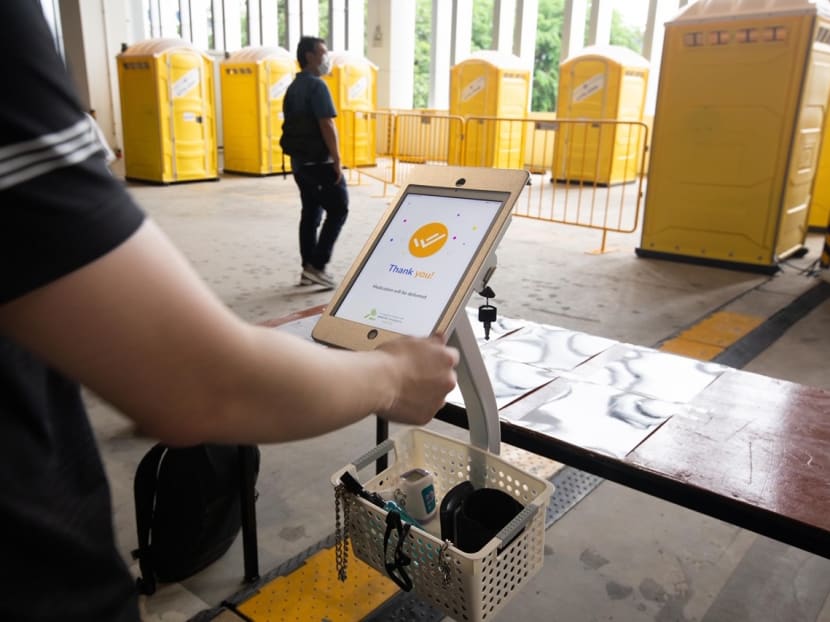S'pore looking to return foreign workers, including Covid-19 survivors, to work in 'recovery phase'
SINGAPORE — Singapore is looking ahead to a “recovery phase” for foreign workers currently isolated in dormitories to allow them to resume working safely, Manpower Minister Josephine Teo said on Sunday (May 10).

Manpower Minister Josephine Teo on May 10, 2020, visiting JTC Space @ Tuas, which will start operations as a medical facility on May 11, 2020.
SINGAPORE — Singapore is looking ahead to a “recovery phase” for foreign workers currently isolated in dormitories to allow them to resume working safely, Manpower Minister Josephine Teo said on Sunday (May 10).
These workers, some of whom have recovered from Covid-19, will be able to return to work as various businesses eventually resume operations. This involves getting the workers tested to ensure they have properly recovered, and to continue monitoring their health, she said.
The new system will involve the distribution of medical technology — including 20,000 pulse oximeters — to worker dormitories and other places they reside in, Mrs Teo added. A pulse oximeter gives an early warning of deteriorating health by measuring the level of oxygen in the blood.
Conducting tele-medical consultations will also be used for foreign workers using tele-kiosks at dormitories or via mobile phones. Since April 25, about 400 consultations between doctors and foreign workers have taken place via phones, the Ministry of Manpower stated in a media release on Sunday.
“The whole point of the recovery is aligned with our approach to eventually allow more activities in the economy to resume,” said Mrs Teo, who spoke to reporters after attending the unveiling of a new Covid-19 medical facility at the JTC Space @ Tuas, catering to foreign workers who do not reside in purpose-built dormitories.
The vast majority of new Covid-19 cases in Singapore in recent weeks have been among foreign workers housed in dormitories.
Mrs Teo said: “We are very mindful that from the worker standpoint, ultimately they are here in Singapore to work. And then from their employers' standpoint, workers are here to support their business. The main objective of this recovery phase is how to enable this to happen in a safe way.”
She said to achieve this, changes in where the foreign workers live and where they work have to be made.
Mrs Teo added that the ministry is now planning a “whole stream of activities” in order to bring about safe living, as well as safe working for these workers, noting that the virus spreads quickly due to communal living, even if hygiene levels are high.
“By safe living and safe working, what we will also enable is for the businesses to continue in a safe way,” she said.
Mrs Teo said the overall operation is “a fairly large piece of work” and that a technical media briefing would be held later to provide further details.
A very important aspect of this recovery phase will be focused on how to strengthen health monitoring and surveillance in dormitories, she said. The ministry is, therefore, looking to use technology to enable more effective medical monitoring.
“We are introducing new measures that will help us to look after the health conditions, and to do the health surveillance of our foreign workers in a more comprehensive way,” she said.
“And we hope that by doing so, we will be able to help the individual worker prevent the recurrence if he has already been infected, or for those who have not been infected to prevent them from falling sick in the first place,” said Mrs Teo.
The new Covid-19 medical facility, which will start operations on Monday, includes a medical post and a swab isolation facility with 150 cubicles for foreign workers to reside in. Of those, 120 will be for workers waiting for their results while the other 30 will be for those who have tested positive. Results usually come back within two to three days.
The medical post is the fifth of its kind outside of those that are available in the 43 purpose-built dormitories. The swab isolation facility is the third of its kind.
A worker will be transported to the medical facility by shuttle bus if he feels the onset of symptoms of acute respiratory infection. He will be assessed by a doctor at the medical post, who will then determine if the worker is required to take the swab test or not.
USING TECHNOLOGY
Mrs Teo said that about 8,000 pulse oximeters had been issued, with another 12,000 to be given out progressively. The priority is to issue the small, easy-to-use devices to workers with Covid-19 displaying mild symptoms in order to see if their health deteriorates.
“So, in all, we're looking at maybe about 20,000 pulse oximeters that will be made available to our foreign workers in the purpose-built dorms, factory-converted dorms as well as the construction temporary quarters.”
Another technological innovation at the medical facility is a tele-kiosk machine which facilitates video consultations with doctors and is connected to devices that can monitor vital signs such as blood pressure, oxygen saturation and temperature.

Workers who are awaiting their results can connect to a doctor through this machine as doctors are available at all times and medication will be delivered to the workers if necessary. Eight tele-kiosks have been installed in other dormitories.
A teleconsultation service via personal mobile devices to provide care after hours has also been set up, enabling workers to contact doctors through WhatsApp video call. Medication will be delivered to the workers if necessary.
“When the workers eventually return to work their work hours are not likely to be the same for each and every one of them,” Mrs Teo said.
“Some of the workers may return to the dormitory at a time where the medical outposts cannot remain open, so we have to look at what are some of the more sustainable ways to continue to perform this health monitoring, which is a very important part of taking care of the foreign workers.”
She added: “We want them to stay healthy. We want them to be able to continue to support their employer. In order to be able to do so, we must find ways to protect their health. And if there is any cluster that is forming, we need to have some way of detecting it so that we can act fast.”








